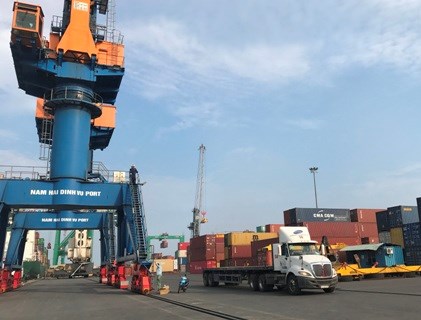Vietnam to lift cross-border trade transaction index
Vietnam plans to raise the cross-border trade transaction index by 3-5 places this year compared to 2018.
 Goods are unloaded at Hai Phong Port in Hai Phong city (Photo thoibaotaichinhvietnam.vn)
Goods are unloaded at Hai Phong Port in Hai Phong city (Photo thoibaotaichinhvietnam.vn)Hanoi (VNS/VNA) - Vietnam plans to
raise the cross-border trade transaction index by 3-5 places this year compared
to 2018.
By 2020, it targets to raise the cross-border trade transaction index by 10-15 places compared to 2018.
Minister of Finance Dinh Tien Dung issued Decision 876/QD-BTC, promulgating the plan to improve Vietnam’s cross-border trade transaction index in the period 2019-2021.
In order to achieve this goal, the Ministry of Finance will chair and coordinate with relevant ministries and sectors in improving operational efficiency of customs authorities; continuing to implement comprehensive reforms of management, specialised inspections and connection to the National Single Window; enhancing quality and reducing time and cost of loading and unloading and circulating of goods in warehouses, yards and ports; improving quality and reduce time and costs of transportation; and promoting activities to support the implementation of import and export procedures.
According to the World Bank's assessment of the cross-border transaction index in the report "Prioritising reforms to reduce trade costs and enhance Vietnam's competitiveness", the time under customs authorities accounts for only 11 percent for imported goods and 4 percent for exported goods in the total time for cross-border import and export.
The time under the unloading, warehousing and logistics units accounts for 28 percent for imported goods and 50 percent for export goods.
Time for compliance with documents for specialised inspection (time for preparing import and export dossiers) and compliance time at border gates for agencies outside customs (time for inspection and issuing inspection report) accounts for 61 percent for imported goods and 46 percent for exported goods.
Costs related to customs inspection and customs brokerage fees account for 11 percent for imported goods and 10 percent for exported goods in the total cost of cross-border trade; costs for loading, unloading and storage at ports and logistics account for 64 percent for imported goods, 63 percent for exported goods; costs for implementing specialised inspection procedures and quality inspection account for 25 percent for imports, 27 percent for exports.
Therefore, to achieve the target of raising the cross-border trade transaction index, according to the Ministry of Finance, there is a need for active participation and concerted efforts of relevant agencies, including customs authorities, specialised management and inspection agencies, people's committees of provinces and cities, import-export businesses, port and yard operators, transport and logistics enterprises.–VNS/VNA
By 2020, it targets to raise the cross-border trade transaction index by 10-15 places compared to 2018.
Minister of Finance Dinh Tien Dung issued Decision 876/QD-BTC, promulgating the plan to improve Vietnam’s cross-border trade transaction index in the period 2019-2021.
In order to achieve this goal, the Ministry of Finance will chair and coordinate with relevant ministries and sectors in improving operational efficiency of customs authorities; continuing to implement comprehensive reforms of management, specialised inspections and connection to the National Single Window; enhancing quality and reducing time and cost of loading and unloading and circulating of goods in warehouses, yards and ports; improving quality and reduce time and costs of transportation; and promoting activities to support the implementation of import and export procedures.
According to the World Bank's assessment of the cross-border transaction index in the report "Prioritising reforms to reduce trade costs and enhance Vietnam's competitiveness", the time under customs authorities accounts for only 11 percent for imported goods and 4 percent for exported goods in the total time for cross-border import and export.
The time under the unloading, warehousing and logistics units accounts for 28 percent for imported goods and 50 percent for export goods.
Time for compliance with documents for specialised inspection (time for preparing import and export dossiers) and compliance time at border gates for agencies outside customs (time for inspection and issuing inspection report) accounts for 61 percent for imported goods and 46 percent for exported goods.
Costs related to customs inspection and customs brokerage fees account for 11 percent for imported goods and 10 percent for exported goods in the total cost of cross-border trade; costs for loading, unloading and storage at ports and logistics account for 64 percent for imported goods, 63 percent for exported goods; costs for implementing specialised inspection procedures and quality inspection account for 25 percent for imports, 27 percent for exports.
Therefore, to achieve the target of raising the cross-border trade transaction index, according to the Ministry of Finance, there is a need for active participation and concerted efforts of relevant agencies, including customs authorities, specialised management and inspection agencies, people's committees of provinces and cities, import-export businesses, port and yard operators, transport and logistics enterprises.–VNS/VNA













